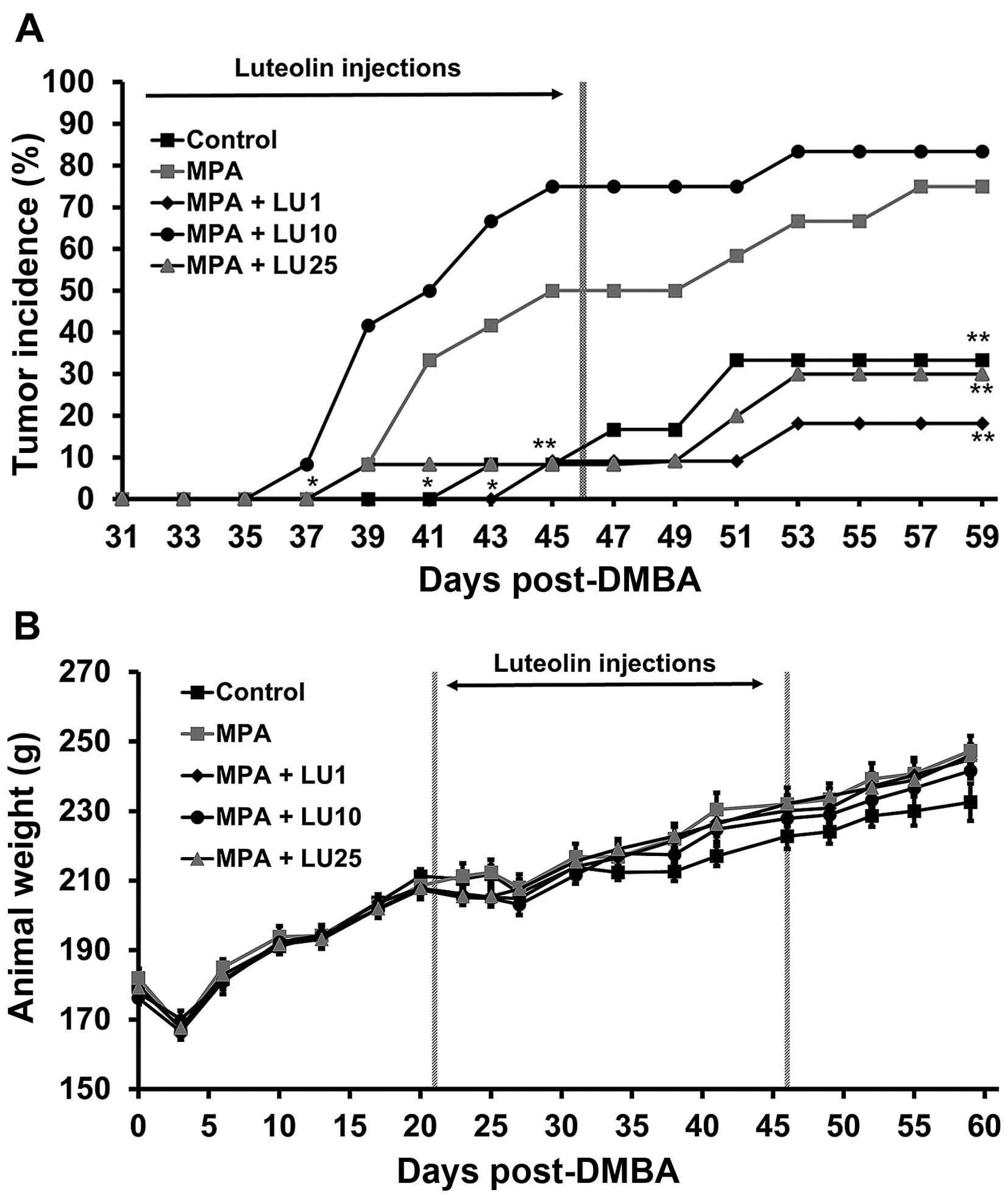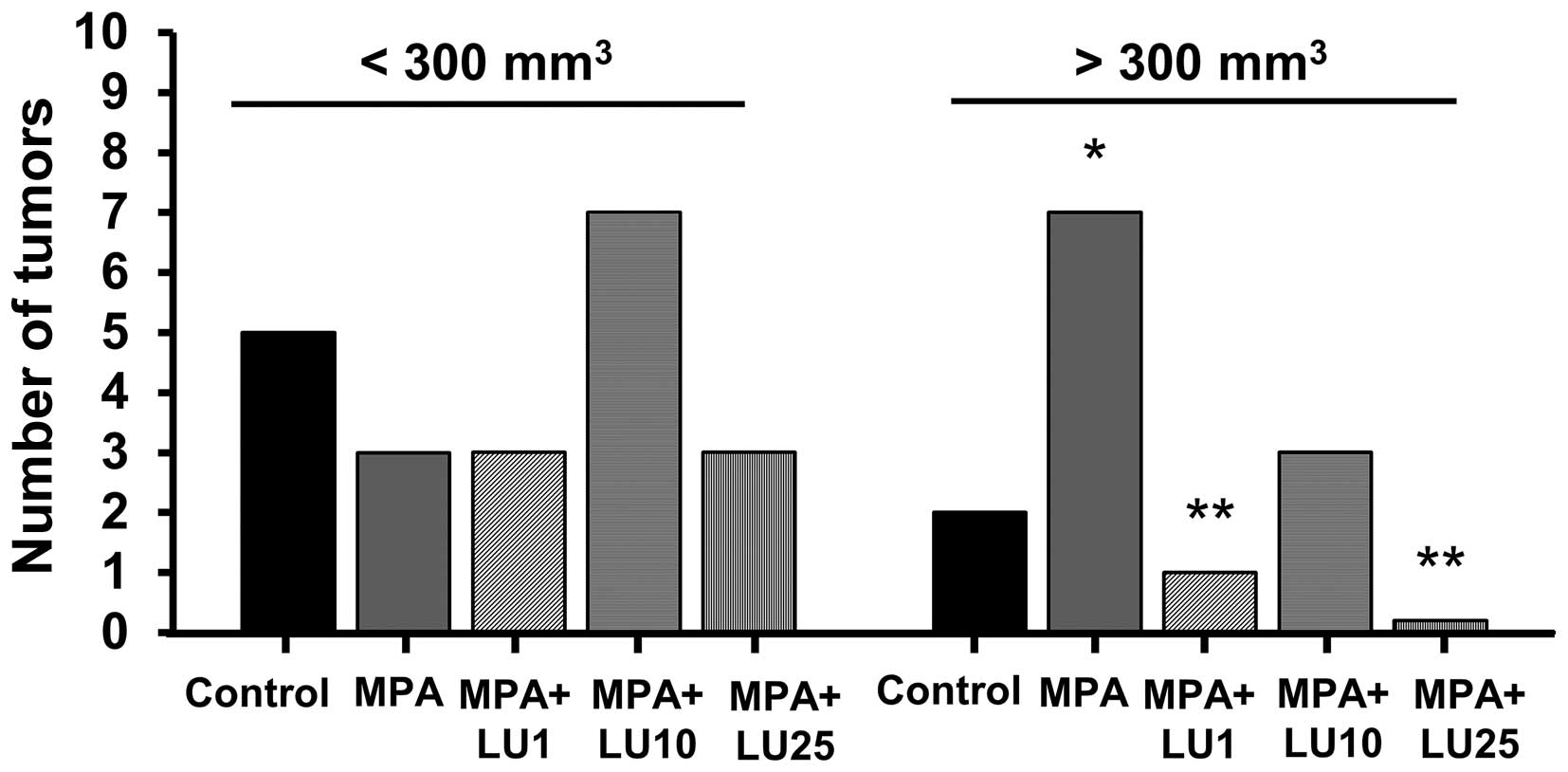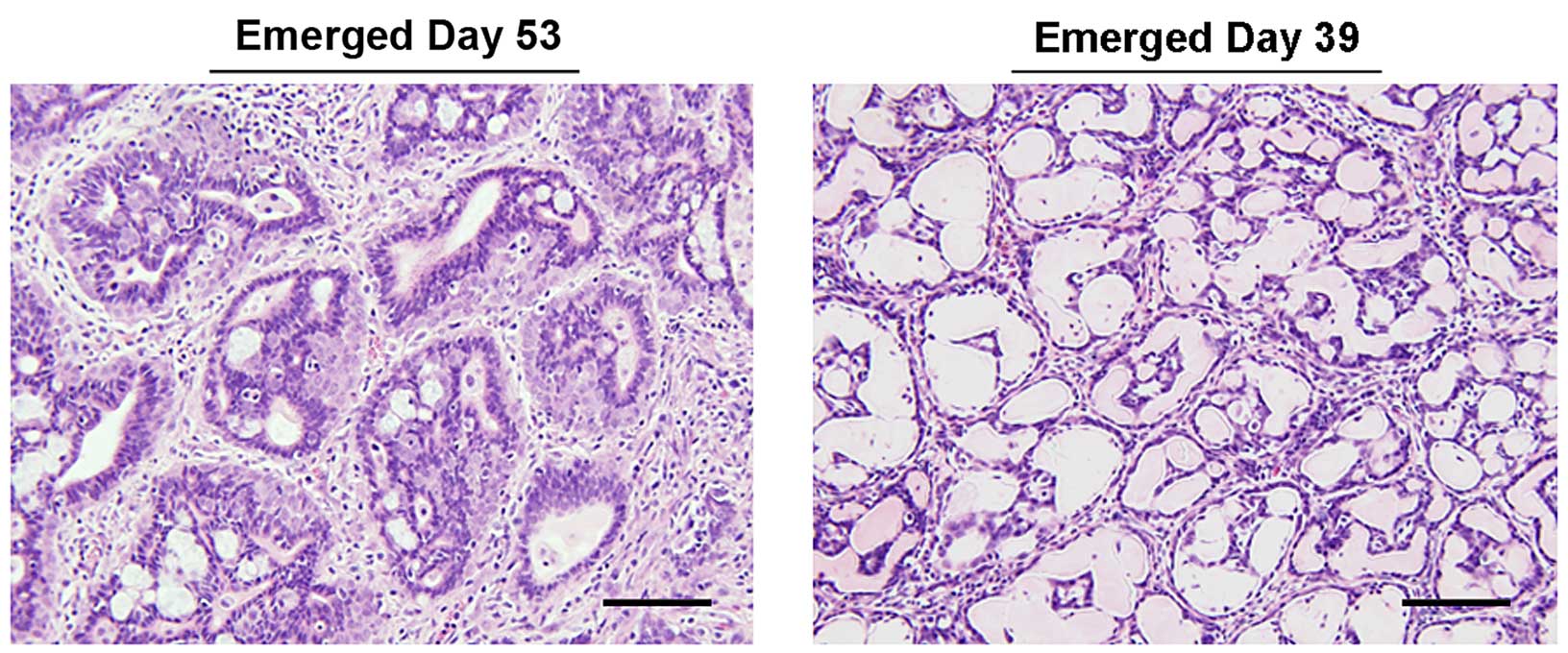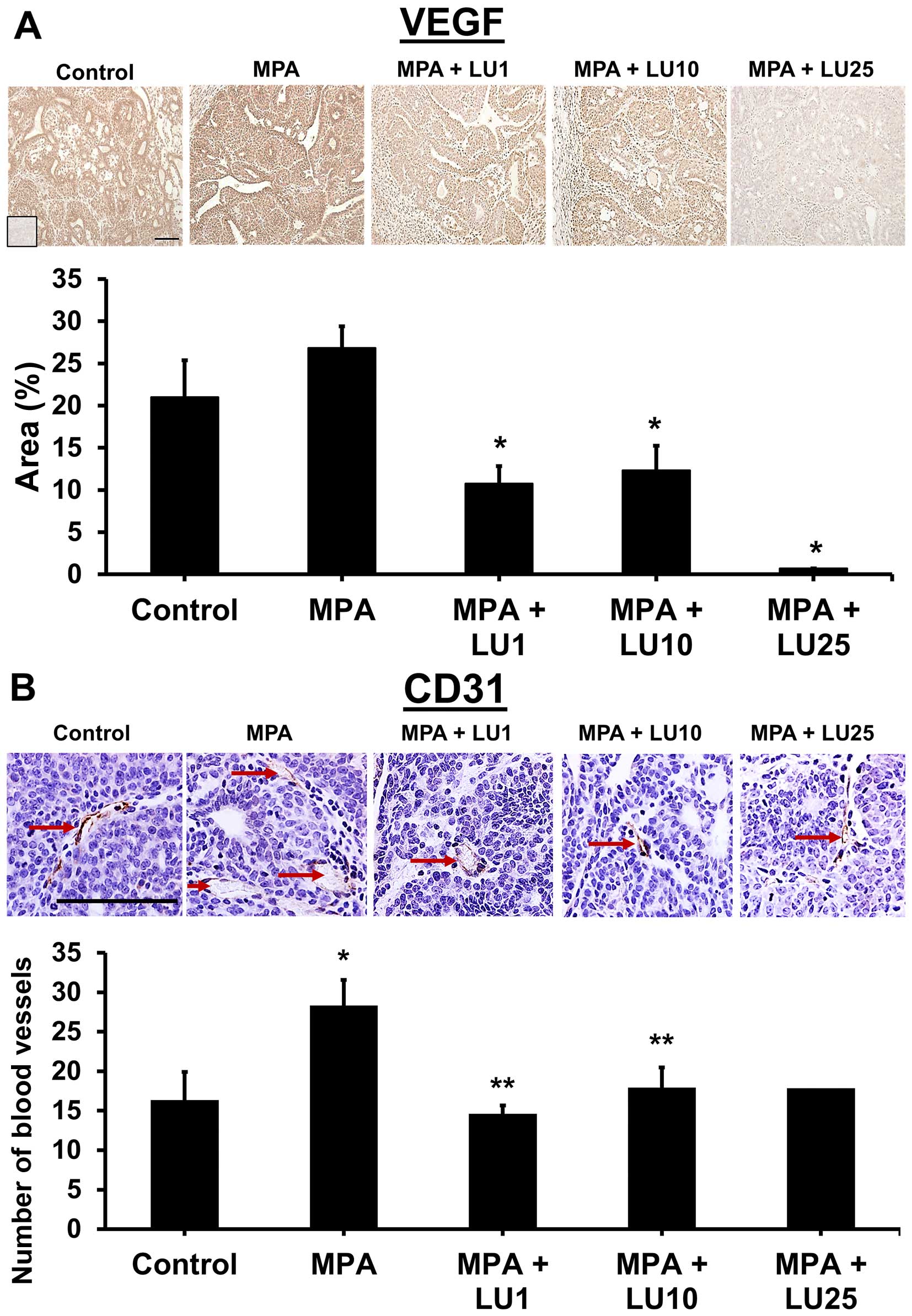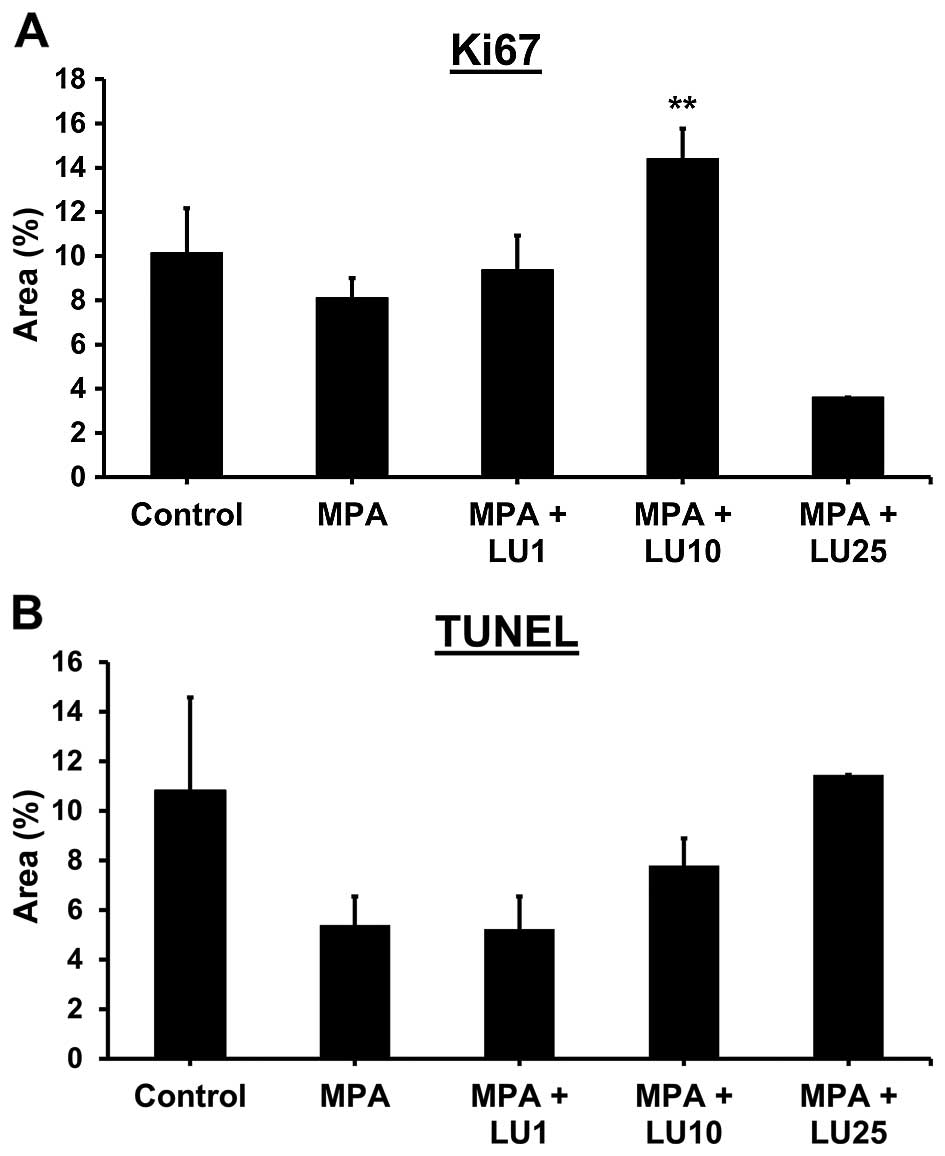|
1
|
Siegel R, Ma J, Zou Z and Jemal A: Cancer
statistics, 2014. CA Cancer J Clin. 64:9–29. 2014. View Article : Google Scholar : PubMed/NCBI
|
|
2
|
Chlebowski RT, Hendrix SL, Langer RD,
Stefanick ML, Gass M, Lane D, Rodabough RJ, Gilligan MA, Cyr MG,
Thomson CA, et al WHI Investigators: Influence of estrogen plus
progestin on breast cancer and mammography in healthy
postmenopausal women: The Women's Health Initiative Randomized
Trial. JAMA. 289:3243–3253. 2003. View Article : Google Scholar : PubMed/NCBI
|
|
3
|
Beral V; Million Women Study
Collaborators: Breast cancer and hormone-replacement therapy in the
Million Women Study. Lancet. 362:419–427. 2003. View Article : Google Scholar : PubMed/NCBI
|
|
4
|
Rossouw JE, Anderson GL, Prentice RL,
LaCroix AZ, Kooperberg C, Stefanick ML, Jackson RD, Beresford SA,
Howard BV, Johnson KC, et al Writing Group for the Women's Health
Initiative Investigators: Risks and benefits of estrogen plus
progestin in healthy postmenopausal women: Principal results from
the Women's Health Initiative randomized controlled trial. JAMA.
288:321–333. 2002. View Article : Google Scholar : PubMed/NCBI
|
|
5
|
Fahlén M, Fornander T, Johansson H,
Johansson U, Rutqvist LE, Wilking N and von Schoultz E: Hormone
replacement therapy after breast cancer: 10 year follow up of the
Stockholm randomised trial. Eur J Cancer. 49:52–59. 2013.
View Article : Google Scholar
|
|
6
|
Horn LC, Schnurrbusch U, Bilek K,
Hentschel B and Einenkel J: Risk of progression in complex and
atypical endometrial hyperplasia: Clinicopathologic analysis in
cases with and without progestogen treatment. Int J Gynecol Cancer.
14:348–353. 2004. View Article : Google Scholar : PubMed/NCBI
|
|
7
|
Pike MC, Peters RK, Cozen W, Probst-Hensch
NM, Felix JC, Wan PC and Mack TM: Estrogen-progestin replacement
therapy and endometrial cancer. J Natl Cancer Inst. 89:1110–1116.
1997. View Article : Google Scholar : PubMed/NCBI
|
|
8
|
Brisken C: Progesterone signalling in
breast cancer: A neglected hormone coming into the limelight. Nat
Rev Cancer. 13:385–396. 2013. View
Article : Google Scholar : PubMed/NCBI
|
|
9
|
Gonzalez-Suarez E, Jacob AP, Jones J,
Miller R, Roudier-Meyer MP, Erwert R, Pinkas J, Branstetter D and
Dougall WC: RANK ligand mediates progestin-induced mammary
epithelial proliferation and carcinogenesis. Nature. 468:103–107.
2010. View Article : Google Scholar : PubMed/NCBI
|
|
10
|
Hyder SM, Murthy L and Stancel GM:
Progestin regulation of vascular endothelial growth factor in human
breast cancer cells. Cancer Res. 58:392–395. 1998.PubMed/NCBI
|
|
11
|
Liang Y, Besch-Williford C, Brekken RA and
Hyder SM: Progestin-dependent progression of human breast tumor
xenografts: A novel model for evaluating antitumor therapeutics.
Cancer Res. 67:9929–9936. 2007. View Article : Google Scholar : PubMed/NCBI
|
|
12
|
Liang Y, Benakanakere I, Besch-Williford
C, Hyder RS, Ellersieck MR and Hyder SM: Synthetic progestins
induce growth and metastasis of BT-474 human breast cancer
xenografts in nude mice. Menopause. 17:1040–1047. 2010. View Article : Google Scholar : PubMed/NCBI
|
|
13
|
Liang Y, Wu J, Stancel GM and Hyder SM:
p53-dependent inhibition of progestin-induced VEGF expression in
human breast cancer cells. J Steroid Biochem Mol Biol. 93:173–182.
2005. View Article : Google Scholar : PubMed/NCBI
|
|
14
|
Liang Y and Hyder SM: Proliferation of
endothelial and tumor epithelial cells by progestin-induced
vascular endothelial growth factor from human breast cancer cells:
Paracrine and autocrine effects. Endocrinology. 146:3632–3641.
2005. View Article : Google Scholar : PubMed/NCBI
|
|
15
|
Joshi PA, Jackson HW, Beristain AG, Di
Grappa MA, Mote PA, Clarke CL, Stingl J, Waterhouse PD and Khokha
R: Progesterone induces adult mammary stem cell expansion. Nature.
465:803–807. 2010. View Article : Google Scholar : PubMed/NCBI
|
|
16
|
Schramek D, Leibbrandt A, Sigl V, Kenner
L, Pospisilik JA, Lee HJ, Hanada R, Joshi PA, Aliprantis A,
Glimcher L, et al: Osteoclast differentiation factor RANKL controls
development of progestin-driven mammary cancer. Nature. 468:98–102.
2010. View Article : Google Scholar : PubMed/NCBI
|
|
17
|
Benakanakere I, Besch-Williford C, Schnell
J, Brandt S, Ellersieck MR, Molinolo A and Hyder SM: Natural and
synthetic progestins accelerate
7,12-dimethylbenz[a]anthracene-initiated mammary tumors and
increase angiogenesis in Sprague-Dawley rats. Clin Cancer Res.
12:4062–4071. 2006. View Article : Google Scholar : PubMed/NCBI
|
|
18
|
Benakanakere I, Besch-Williford C, Carroll
CE and Hyder SM: Synthetic progestins differentially promote or
prevent 7,12-dimethylbenz(a)anthracene-induced mammary tumors in
Sprague-Dawley rats. Cancer Prev Res (Phila). 3:1157–1167. 2010.
View Article : Google Scholar
|
|
19
|
Mafuvadze B, Benakanakere I, López Pérez
FR, Besch-Williford C, Ellersieck MR and Hyder SM: Apigenin
prevents development of medroxyprogesterone acetate-accelerated
7,12-dimethylbenz(a) anthracene-induced mammary tumors in
Sprague-Dawley rats. Cancer Prev Res (Phila). 4:1316–1324. 2011.
View Article : Google Scholar
|
|
20
|
Mafuvadze B, Liang Y, Besch-Williford C,
Zhang X and Hyder SM: Apigenin induces apoptosis and blocks growth
of medroxyprogesterone acetate-dependent BT-474 xenograft tumors.
Horm Cancer. 3:160–171. 2012. View Article : Google Scholar : PubMed/NCBI
|
|
21
|
Mafuvadze B, Cook M, Xu Z, Besch-Williford
CL and Hyder SM: Effects of dietary apigenin on tumor latency,
incidence and multiplicity in a medroxyprogesterone
acetate-accelerated 7,12-dimethylbenz(a)anthracene-induced breast
cancer model. Nutr Cancer. 65:1184–1191. 2013. View Article : Google Scholar : PubMed/NCBI
|
|
22
|
Lin Y, Shi R, Wang X and Shen HM:
Luteolin, a flavonoid with potential for cancer prevention and
therapy. Curr Cancer Drug Targets. 8:634–646. 2008. View Article : Google Scholar : PubMed/NCBI
|
|
23
|
López-Lázaro M: Distribution and
biological activities of the flavonoid luteolin. Mini Rev Med Chem.
9:31–59. 2009. View Article : Google Scholar : PubMed/NCBI
|
|
24
|
Seelinger G, Merfort I, Wölfle U and
Schempp CM: Anti-carcinogenic effects of the flavonoid luteolin.
Molecules. 13:2628–2651. 2008. View Article : Google Scholar : PubMed/NCBI
|
|
25
|
Bagli E, Stefaniotou M, Morbidelli L,
Ziche M, Psillas K, Murphy C and Fotsis T: Luteolin inhibits
vascular endothelial growth factor-induced angiogenesis; inhibition
of endothelial cell survival and proliferation by targeting
phosphatidylinositol 3′-kinase activity. Cancer Res. 64:7936–7946.
2004. View Article : Google Scholar : PubMed/NCBI
|
|
26
|
Pratheeshkumar P, Son YO, Budhraja A, Wang
X, Ding S, Wang L, Hitron A, Lee JC, Kim D, Divya SP, et al:
Luteolin inhibits human prostate tumor growth by suppressing
vascular endothelial growth factor receptor 2-mediated
angiogenesis. PLoS One. 7:e522792012. View Article : Google Scholar
|
|
27
|
Selvendiran K, Koga H, Ueno T, Yoshida T,
Maeyama M, Torimura T, Yano H, Kojiro M and Sata M: Luteolin
promotes degradation in signal transducer and activator of
transcription 3 in human hepatoma cells: An implication for the
antitumor potential of flavonoids. Cancer Res. 66:4826–4834. 2006.
View Article : Google Scholar : PubMed/NCBI
|
|
28
|
Luo H, Jiang BH, King SM and Chen YC:
Inhibition of cell growth and VEGF expression in ovarian cancer
cells by flavonoids. Nutr Cancer. 60:800–809. 2008. View Article : Google Scholar : PubMed/NCBI
|
|
29
|
Nordeen SK, Bona BJ, Jones DN, Lambert JR
and Jackson TA: Endocrine disrupting activities of the flavonoid
nutraceuticals luteolin and quercetin. Horm Cancer. 4:293–300.
2013. View Article : Google Scholar : PubMed/NCBI
|
|
30
|
Fang J, Zhou Q, Shi XL and Jiang BH:
Luteolin inhibits insulin-like growth factor 1 receptor signaling
in prostate cancer cells. Carcinogenesis. 28:713–723. 2007.
View Article : Google Scholar
|
|
31
|
Zhou Q, Yan B, Hu X, Li XB, Zhang J and
Fang J: Luteolin inhibits invasion of prostate cancer PC3 cells
through E-cadherin. Mol Cancer Ther. 8:1684–1691. 2009. View Article : Google Scholar : PubMed/NCBI
|
|
32
|
Samy RP, Gopalakrishnakone P and
Ignacimuthu S: Anti-tumor promoting potential of luteolin against
7,12-dimethylbenz(a) anthracene-induced mammary tumors in rats.
Chem Biol Interact. 164:1–14. 2006. View Article : Google Scholar : PubMed/NCBI
|
|
33
|
Faustino-Rocha A, Oliveira PA,
Pinho-Oliveira J, Teixeira-Guedes C, Soares-Maia R, da Costa RG,
Colaço B, Pires MJ, Colaço J, Ferreira R, et al: Estimation of rat
mammary tumor volume using caliper and ultrasonography
measurements. Lab Anim (NY). 42:217–224. 2013. View Article : Google Scholar
|
|
34
|
Tomayko MM and Reynolds CP: Determination
of subcutaneous tumor size in athymic (nude) mice. Cancer Chemother
Pharmacol. 24:148–154. 1989. View Article : Google Scholar : PubMed/NCBI
|
|
35
|
Vandenberg LN, Colborn T, Hayes TB,
Heindel JJ, Jacobs DR Jr, Lee DH, Shioda T, Soto AM, vom Saal FS,
Welshons WV, et al: Hormones and endocrine-disrupting chemicals:
Low-dose effects and nonmonotonic dose responses. Endocr Rev.
33:378–455. 2012. View Article : Google Scholar : PubMed/NCBI
|
|
36
|
Markaverich BM, Shoulars K and Rodriguez
MA: Luteolin regulation of estrogen signaling and cell cycle
pathway genes in MCF-7 human breast cancer cells. Int J Biomed Sci.
7:101–111. 2011.PubMed/NCBI
|
|
37
|
Le Bail JC, Varnat F, Nicolas JC and
Habrioux G: Estrogenic and antiproliferative activities on MCF-7
human breast cancer cells by flavonoids. Cancer Lett. 130:209–216.
1998. View Article : Google Scholar : PubMed/NCBI
|
|
38
|
Zand RSR, Jenkins DJ and Diamandis EP:
Steroid hormone activity of flavonoids and related compounds.
Breast Cancer Res Treat. 62:35–49. 2000. View Article : Google Scholar : PubMed/NCBI
|
|
39
|
Carroll CE, Liang Y, Benakanakere I,
Besch-Williford C and Hyder SM: The anticancer agent YC-1
suppresses progestin-stimulated VEGF in breast cancer cells and
arrests breast tumor development. Int J Oncol. 42:179–187.
2013.
|
|
40
|
Knutson TP and Lange CA: Tracking
progesterone receptor-mediated actions in breast cancer. Pharmacol
Ther. 142:114–125. 2014. View Article : Google Scholar :
|
|
41
|
Hyder SM, Chiappetta C and Stancel GM:
Pharmacological and endogenous progestins induce vascular
endothelial growth factor expression in human breast cancer cells.
Int J Cancer. 92:469–473. 2001. View Article : Google Scholar : PubMed/NCBI
|
|
42
|
Cittelly DM, Finlay-Schultz J, Howe EN,
Spoelstra NS, Axlund SD, Hendricks P, Jacobsen BM, Sartorius CA and
Richer JK: Progestin suppression of miR-29 potentiates
dedifferentiation of breast cancer cells via KLF4. Oncogene.
32:2555–2564. 2013. View Article : Google Scholar
|
|
43
|
Horwitz KB, Dye WW, Harrell JC, Kabos P
and Sartorius CA: Rare steroid receptor-negative basal-like
tumorigenic cells in luminal subtype human breast cancer
xenografts. Proc Natl Acad Sci USA. 105:5774–5779. 2008. View Article : Google Scholar : PubMed/NCBI
|
|
44
|
Löscher W, Mevissen M and Häussler B:
Seasonal influence on 7,12-dimethylbenz[a]anthracene-induced
mammary carcinogenesis in Sprague-Dawley rats under controlled
laboratory conditions. Pharmacol Toxicol. 81:265–270. 1997.
|
















